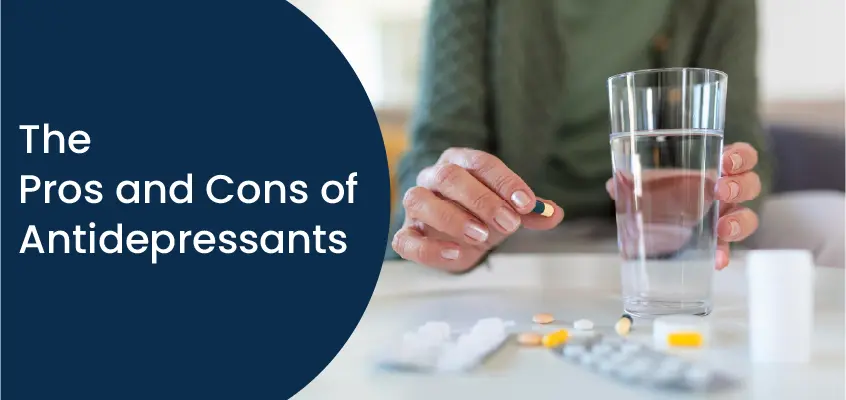Introduction
Medications that treat psychiatric conditions such as depression have led to many controversies. While some people are neutral in the debate on whether antidepressants are beneficial or harmful, many are vocal about their doubts regarding the safety of this class of drugs. They believe there are too many side effects to taking antidepressant medications, and they worry that regularly taking this drug can cause dependency on the drugs.
However, we must understand that rumours and conjectures are not the proper basis for understanding a medical condition. The best place to start is by doing research and seeking professional help.
What are antidepressants?
They are a class of psychiatric medications used to treat depression. Some of them help treat conditions such as:
-
Bulimia (eating disorder)
-
Anxiety disorders
-
Phobias
-
Chronic pain.
How do antidepressants work?
Antidepressants work by:
-
Affecting neurotransmitters
-
Reducing the biological effects of stress on the brain
-
Reducing neuroinflammation, which is an inflammatory condition that affects the brain or spinal cord
-
Improving the brain’s ability to cope with stress.
You may not notice the effects of consuming this drug for a few weeks because these medications don’t show results immediately. Antidepressants come in various forms, so it may take time to understand which works best.
What are the different types of antidepressants?
There are five types of antidepressants. The doctor will suggest which one to use according to the severity of the depression. Always consult a doctor before taking any medication.
Selective serotonin reuptake inhibitors (SSRIs)
SSRIs are the most common treatment option for depression.
Serotonin and norepinephrine reuptake inhibitors (SNRIs)
SNRIs work the same way as SSRIs. Doctors may suggest taking SNRIs for:
-
Attention deficit hyperactivity disorder (ADHD)
-
Obsessive-compulsive disorder (OCD)
-
Fibromyalgia
-
Anxiety disorders
-
Menopausal symptoms
-
Chronic neuropathic pain.
Tricyclic antidepressants (TCAs)
Doctors usually recommend TCAs for the treatment of:
-
Depression
-
Fibromyalgia
-
Anxiety
-
Chronic pain.
Monoamine oxidase inhibitors (MAOIs)
Doctors do not generally prescribe MAOIs as a first-line treatment option for depression, as these drugs have adverse side effects. They do it when SSRIs are unable to treat a specific depression.
Noradrenaline and specific serotoninergic antidepressants (Nassau)
Doctors prescribe NaSSAs to treat depression as well as anxiety disorders.
Side effects associated with taking antidepressants
While every person’s response to antidepressants is different, there are some common side effects, including:
-
Nausea
-
Weight gain
-
Reduced sex drive
-
Tiredness
-
Insomnia
-
Blurry vision
-
Constipation
-
Dizziness
-
Anxiety.
These side effects generally disappear within a few weeks after starting the medications.
Importance of antidepressants
Here’s why they are essential in the treatment of depression:
-
Relieves symptoms
Although they take a few weeks to reach their full effect, and we might need to try more than one type to find the one that works best for us, antidepressants are more effective than placebos in treating major depression in adults.
-
Generally safe and well-researched
Antidepressants are safe to use as they have been approved by most healthcare authorities, which means they have undergone extensive testing and clinical trials. Studies have shown that antidepressants can be safe for vulnerable groups such as pregnant women, organ transplant recipients, people with active tumours, and stroke patients.
-
Motivates to change lifestyle
The fact that we can manage our antidepressant medication on our own every day is a significant benefit. For some people, we are doing regular therapy sessions or self-care practices such as exercise, yoga, and eating a nutritious diet while on antidepressants can be extra helpful.
-
Enhances the standard of living
Antidepressants enable improvements in mood, reasonably and, thus, quality of life. These medications would allow individuals to be less reactive to adverse life events.
Conclusion
In general, antidepressants are a safe option for treating depression. They come in different classes, and each category contains a variety of medications. It can take some time to find the right one for us, and we might need to change the medicine if it doesn’t suit us. Medication and psychotherapy, when taken together, increase the results of both.
It’s a big decision to take an antidepressant, and we should always talk to a doctor before starting any medications.
| [1] | “Antidepressants: Selecting one that’s right for you,” Mayo Clinic, 23-Sep-2022. [Online]. Available: https://www.mayoclinic.org/diseases-conditions/depression/in-depth/antidepressants/art-20046273. [Accessed: 17-Jan-2023]. |
| [2] | “Overview – antidepressants,” NHS.uk. [Online]. Available: https://www.nhs.uk/mental-health/talking-therapies-medicine-treatments/medicines-and-psychiatry/antidepressants/overview/. [Accessed: 17-Jan-2023]. |










